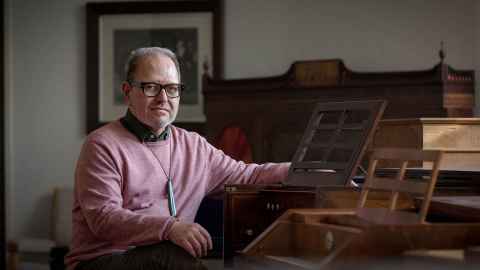First People’s experiences, largely left out of traditional music curricula, are foregrounded in a new book.

As a young man training as an opera singer in the conservatory tradition, Dr Te Oti Rakena learned all about lives of the great Western composers.
But one example of what he wasn’t taught, was that the music practices of the Indigenous Sami people of northern Europe were once deemed ‘witchcraft’ and suppressed, and that Sami have subsequently struggled to reclaim those practices.
“I only learnt about this recently, but it was profound for me,” says Te Oti (Ngāpuhi, Ngati Ruanui, Kāi Tahu), an associate professor in the School of Music, “because it parallels stories of Indigenous people in Canada, of Indigenous people in Australia, and of course Māori.”
The Sami story is among the contributions to a new textbook Te Oti has edited, which foregrounds Indigenous experiences and research in music teaching. Decolonising and Indigenising Music Education: First Peoples Leading Research and Practice, produced with the International Society of Music Educators (ISME), is a first in field, he says, in its telling of stories largely left out of current music curricula.
“They’re stories that we’ve never heard, and that we should know. I know the dates associated with Haydn, with Beethoven, their histories and their struggles in Western Europe very well, but I knew none of this.
“These stories are not really known outside their communities, because why would you share them if you didn’t trust that they’re going to be reported well?
“That’s the space we’ve created with this book; we are allowing the people of the community to report them.”
They’re stories that we’ve never heard, and that we should know.
Associate Professor Te Oti Rakena
School of Music
A vocal performer, researcher and award-winning educator, Te Oti, like many of his students, began singing in his community. In his case, as the son of a prominent Methodist minister, in church.
He went on to study at the New England Conservatory in Boston and completed a doctorate in vocal studies at the University of Texas at Austin, where he began his vocal teaching career.
“I’m an opera singer by training for sure, but I’m most interested in helping people find their singing voice, particularly the undergraduate classical voice.
“That has a lot of connections with community music, because that’s where most singers find their love of singing: community choirs, musical theatre groups and, of course, kapa haka. And for many of our Pacific students, it’s through church, which is what I came through.”
It was via his experience preparing singers for the rigours of competing at Te Matatini that Te Oti first joined the community music-focused research group of ISME, the global body of music educators. That was in 2005, and he was the first Indigenous academic to do so.
“What I noticed in the community music area, as the only Indigenous person, was that there was data being reported, but quite often that wasn’t being done by a representative of that community.”
Te Oti ultimately became a driving force in the formation of ISME’s Decolonising and Indigenising Music Education global steering group, which has subsequently produced the book. The title was recently launched in Finland, at ISME’s biennial conference.
“Many Māori and Pacific peoples working in this area get these opportunities, and we look at them and we don’t have the time, but it’s not about us, it’s about uplifting our communities, so we make the time.”
More widely, Te Oti’s teaching and research career has been characterised by his efforts to improve the quality of education for Māori and Pacific students.
His teaching in the School of Music’s voice programme involves creating a learning community around the studio, transforming it from a physical space to a relational one. This creates the ability for not only the teacher, but also students and their families, to have a voice, and support each other as a cohort.
In 2021 his teaching innovations, which also include incorporating scholarship from Māori academics and uplifting different communities’ music practices, helped him win a Tertiary Teaching Excellence Award.
While Te Oti has trained opera superstars like Moses Mackay and Manase Latu, the demands of a high-profile operatic singing career aren’t for everyone, he says. But there are many paths a gifted singer can take; he’s had students pursue successful, fulfilling careers, for example, in opera directing and musical theatre, as choral directors, community music facilitators, teachers, and voice-science and vocal-health researchers.
“What my teaching has allowed me to do is guide and mentor people into areas that they really love and that are still connected to voice. So I’m really giving them options and helping them find spaces where they will be successful,” he says.
“I love seeing that trajectory.”
Caitlin Sykes
This article first appeared in the August 2024 issue of UniNews.







